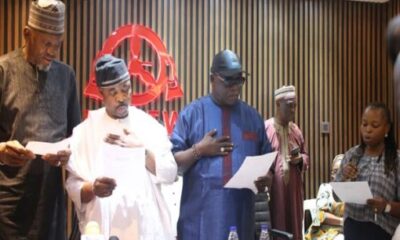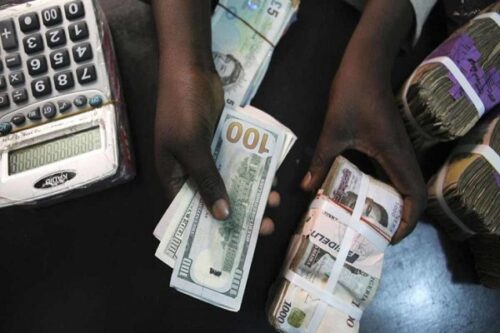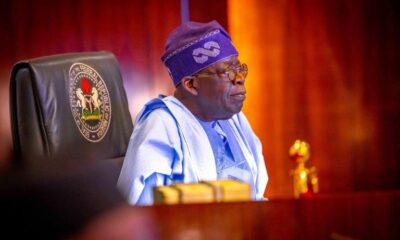Nigeria’s foreign reserves may have begun a gradual comeback after nearly three months of straight falls.
The reserves concluded the weekend at $33.954 billion, up from $33.949 billion the previous week.The increase is the first in 11 weeks.At the unified market-driven platform, the naira rose by 4.4 percent to N743.07 per dollar. Unmet forex demands continue to put pressure on the local currency, which remains volatile.
The reserves had recently been under significant pressure as the government grappled with a multiple exchange rate system. There was a 300-basis-point difference between the official and parallel market rates.
The reserves peaked at $37.211 billion on January 16, 2023, after closing at around $37.08 billion in 2022. It stayed on the decline, in many cases falling for several weeks in a row. In the first half of 2023, the reserves lost nearly $2.9 billion.
In accordance with President Bola Tinubu’s economic policy, the Central Bank of Nigeria (CBN) eliminated the multiple exchange rate system and its close-managed official rate on June 14, 2023.
The central bank implemented a market-determined system that primarily leaves the country’s currency to forces of demand and supply.
Experts agreed that the foreign reserves would remain under pressure in the meantime due to a backlog of demand, limited supply, and the customary policy time lag required for transitional effects.
Several analysts were however optimistic recent policy mix by the new government would substantially alter the forex position, providing a stable point for a steady build-up of forex reserves and a stable naira.
According to analysts, a mix of increased oil receipts, foreign investments, remittances, and reduction in forex management could boost reserves and naira stability in the medium to long term.
Global rating agency, Standard and Poor’s (S&P), at the weekend, upgraded Nigeria’s credit outlook to stable from negative. The agency premised the upgrade on recent policies by the Tinubu administration.
The latest report on foreign portfolio investments (FDIs) shows that Nigeria returned to a net positive position in the second quarter of 2023, driven largely by foreign inflows in the last two months.
Managing Director, Arthur Steven Asset Management, Mr Olatunde Amolegbe, said the modest recovery in forex reserves might not be unconnected with a reduction in demand due to the removal of fuel subsidy and new forex policies.
“The expectation is that the pace of accretion might accelerate due to increased in foreign inflows and improved oil export if the issue of theft and security could be tackled,” Amolegbe, a former president of Chartered Institute of SStockbrokers (CIS), said.
He, however, noted that the apex bank may eventually settle for a managed float regime in order to cure the policy time lag and avoid undue damage to the economy before attaining forex stability.
This implies that the apex bank may intervene from time to time to ensure the naira remains within a range.
President Tinubu had also hinted that while the government remains committed to a market economy, it would take due cognizance of undue volatility and take appropriate measures to support stability.
Analysts at Cordros Capital Group said they expected currency pressures to remain intact in the near term, given seasonal-induced demand.
They noted that the forex supply is still frail despite recent policy measures.
“On forex supply, we expect foreign investors to remain on the sidelines in the near term, as they continue to look for signals on market interest rates and solutions to the existing forex backlog and supply issues,” Cordros Capital Group stated.
President of the Association of Capital Market Academics, Prof Uche Uwaleke, said the forex accretion might be due to recent policy measures, although the outlook remains grim.
His words: “The accretion may be the result of favorable oil price and improvements in crude oil output. It could also have been helped by the recent increase in foreign portfolio investments in the wake of the unification of exchange rates.
“But it is very marginal and insufficient to make any significant impact on the exchange rate in view of the unmet demand as well as increasing demand pressure.
“External reserves serve many purposes including being used to defend the value of a country’s currency.
“Unfortunately for Nigeria, crude oil sales still account for over 90 percent of forex earnings.
“In this regard, the outlook for forex will remain grim until we can establish multiple streams of forex including through diversifying the country’s export base.”

 BIG STORY12 hours ago
BIG STORY12 hours ago
 BIG STORY7 hours ago
BIG STORY7 hours ago
 BIG STORY19 hours ago
BIG STORY19 hours ago
 BIG STORY3 days ago
BIG STORY3 days ago
 BIG STORY3 days ago
BIG STORY3 days ago
 BIG STORY2 days ago
BIG STORY2 days ago
 BIG STORY2 hours ago
BIG STORY2 hours ago
 BIG STORY3 days ago
BIG STORY3 days ago




















